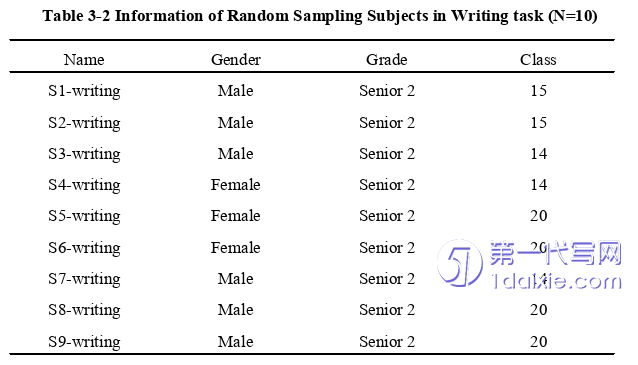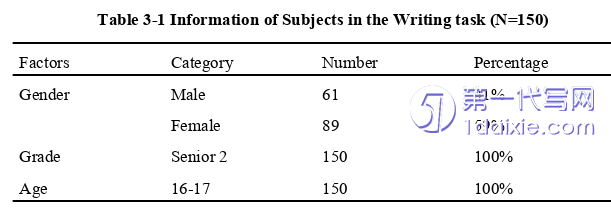本文是一篇英语论文,笔者认为根据行为主义语言学习理论,语言学习的主要障碍是先验知识的干扰。Corder(1981)认为,学习者的母语为他们提供了关于目标语言的极其丰富的假设。只有通过大量的目的语输入,才能降低母语的干扰程度,建立目的语的认知语法系统。
Chapter One Introduction
1.1 Background of the Study
The General Senior High School Curriculum Standards:English(2017edition)presented the concept of English subject core competencies.English language abilityis the basic element that constitutes the English subject core competencies.Englishsubject core competencies advocates to examine students in a holistic way rather thanin a isolated way.Among the skill of listening,speaking,reading,and writing,writingexamines students’global skills and plays a significant part in the teaching of Englishin senior high schools.During the second language learning process,English writinghas always been of great interest to English teachers and learners,meanwhile,writingis also a weakness for most students in Chinese English classrooms.English teachersin primary and lower secondary schools train students to write compositions usingsimple sentence patterns,while senior high school English teachers always askstudents to use the same grammatical framework and structure to apply sentencepatterns.Under such a long-term teaching method,high school English learners’thoughts are imprisoned,and the fixed grammatical structure also makes the sentencesthat written by learners full of loopholes.Compositions written in the Chinese modeof thinking result in students’compositions that do not correspond to either their firstlanguage or the target language.Many students have been learning English for 7 or 8years in senior high school,but their English writing ability has not improved much.Itis difficult to improve their English level after reaching a certain stage,and theirlanguage expression ability is still difficult to make substantive breakthrough.This isfossilization in interlanguage.Numerous researches have revealed that most learners’interlanguage stagnate after a certain level instead of making steady progress towardsthe target language as before,and that some errors never completely disappear.
1.2 Significance of the Study
1.2.1 Theoretical Significance
Firstly,this study investigated whether there is lexical fossilization in seniorhigh school students’English writing and explored the distribution and causes of thepresence of the lexical fossilization.It also complemented the literature on lexicalfossilization,especially,it complemented the absence of empirical studies in theXinjiang region.Secondly,to a certain extent,it expanded the research scope offossilization theory and provided a theoretical basis for the current English writingteaching in senior high schools which will make a modest theoretical reference forXinjiang front-line senior high schools’teachers in the field of lexical fossilization.Without essential background knowledge,we may not have a complete perspective to fully investigate this phenomenon,and it may be difficult to find a direction for ourstudy.Thirdly,it is significant to explore fossilization issues in teaching vocabularyfor L2 learning,and the study of fossilization in second language acquisition inXinjiang has been further refined,it has led to a gradual increase in research fromgrand scale research to microscopic research.

Chapter Two Literature Review
2.1 Relevant Concepts
2.1.1 Fossilization
2.1.1.1 Definition of Fossilization
Fossilization was initially developed by Selinker(1972).It is a widespreadphenomenon in L2 acquisition.According to the view of linguists and languagelearners,second language learners can seldom attain a completely similar level totheir native language.Selinker(1972:215)proposed that fossilizable linguisticphenomena are linguistic items,rules and subsystems which speakers of a particularnative language will tend to keep in their interlanguage relative to a particular targetlanguage,no matter what the age of the learner or amount of explanation andinstruction he receives in the target language.
Interlanguage fossilization is a mechanism in the psychological structure.Because of this mechanism,the second language learners cannot acquire the targetlanguage at one go.There are certain errors in the interlanguage,which are repetitiveand stubborn.Some parts of the language may stop progressing and produce thephenomenon of“fossilization”.Some rules of the first language will always exist inthe interlanguage and become barriers to the acquisition of the second language,which makes the interlanguage“fossilized”.Once the fossilization is formed,it isdifficult to change or break through.
2.2 Theoretical Foundation
2.2.1 Error Analysis(EA)
Before the 1970s,Error Analysis only summarized and classified the commonerrors without systematization.After the 1970s,with the decline of comparativeanalysis and the growth of mentalism,EA gradually gained popularity.In the early1960s,inspired by Chomsky’s theory of language acquisition,researchers of nativelanguage acquisition began to study the speech of children acquired by nativelanguage.They put forward the same view as Chomsky,that language acquisition isnot the product of habit formation,but the product of rule formation.Chomsky’stheory of language acquisition received support from first language acquisitionresearchers recording the errors of children.Especially noteworthy for SLA was thatSL learners were found to commit similar“developmental”errors,errors that werenot apparently due to first interference.Thus,by extension,the process of SLA wasalso thought to be one of rule formation.
2.2.1.1 Definition of EA
Error Analysis(EA)was proposed in The Significance of Learner’s Errorspublished by Corder in 1976.Subsequently,Corder published a series of papers onError Analysis in 1967 and 1974,leading the trend of using Error analysis as a tool for second language acquisition research.Error analysis mainly studies and analyzesthe errors made by second language learners in their learning process,and aims tosystematically decompose the errors made by second language learners,find out theroot causes of errors,reveal the learning process and cognitive model of secondlanguage learners,help learners to correct errors,modify learning strategies,andultimately develop learners’writing abilities.
Chapter Three Research Design....................................28
3.1 Research Aims....................................28
3.2 Research Questions.......................28
3.3 Research Subjects.............................29
Chapter Four Results and Discussion....................................36
4.1 Lexical Fossilization in Xinjiang Senior High School Students’Composition...................................36
4.2 Distribution of Fossilized Lexical Errors in Xinjiang Senior High SchoolStudents’Composition........................38
Chapter Five Conclusion......................................73
5.1 Major Findings...............................................73
5.2 Strategies to Reduce Lexical Fossilization.................................74

Chapter Four Results and Discussion
4.1 Lexical Fossilization in Xinjiang Senior High SchoolStudents’Composition
In this part of data analysis,the author explored whether there is lexicalfossilization in senior high school students’English writing by comparing the data oferror frequency in the same category of two batch of compositions.Han(2008)suggested that fossilization is a process which can be reflected by the results of erroranalysis.According to the definition and characteristics of errors,the errors repeatedby the learners in the compositions have been regarded as the fossilized lexical errors.According to Corder(1974),the procedure of error analysis should be divided intofive steps:collect learner samples,identify the errors,description of errors,explanation of errors,evaluation of errors.With the help of three experienced teachers,the author completed the error identification,correction,classification,and countedthe errors by hand in order to obtain accurate and reliable results.By comparing theanalysis results of lexical fossilization in the two compositions,especially thefrequency of the same type of lexical errors,we can find out whether there is lexicalfossilization exist in the senior high school students’compositions.
To ensure that the compositions are of the highest quality,students were requiredto write compositions independently during class time.Under the supervision of anEnglish teacher,without the use of any electronic devices or dictionaries.Studentswere asked to check their compositions carefully before they hand them in and theywere given time to self-correct to make sure there are no mistakes due to carelessness,so that the writer can identify errors rather than mistakes in the composition.Aftererror identification and error correction of 300 compositions,the author adopted theerror classification in Gui’s(2005)study and combined with the collected compositiondata,then the author classified errors into 11 categories:incorrect word spelling,misuse of articles,nouns,verbs,adjectives,adverbs,prepositions,pronouns,conjunction errors,word class and others.
Chapter Five Conclusion
5.1 Major Findings
The author conducted an 4 month empirical and longitudinal study on thelexical fossilization existed in Xinjiang senior high school students’English writing.After collecting and analyzing 300 compositions,600 questionnaires and 10 randominterviews,the author solved the research question of this study:
(1)Through the collection and comparison of lexical errors in the compositionsof the same group of 150 subjects before and after a semester.The author adopted theerror classification in Gui’s(2005)study.According to the analysis of Chineselearners’English based on CLEC corpus,the author divided lexical errors in to 11categories:incorrect word form,misuse of articles,nouns,verbs,adjectives,adverbs,prepositions,pronouns,conjunction errors and others.For the 11 different error types,the statistical difference in the number of errors between the two compositions did notnarrow,and there was a significant increase in the number of errors for articles,nouns,verbs,adjectives,prepositions and conjunctions.According to Han(2008),fossilization is a process which can be reflected by the results of error analysis.So,itcan be proved that lexical fossilization exist in the English writing of Xinjiang seniorhigh school students.
(2)By comparing the error frequency of the two compositions,the author found11 types of lexical errors distributed in students’composition:incorrect word spelling,misuse of articles,nouns,verbs,adjectives,adverbs,prepositions,pronouns,conjunctions,word class and others,and classified them into the lexical competencefossilization and the lexical errors fossilization.Among all the collected compositionsamples,the author conducted a random sampling and selected 10 subjects tocompare and analyse their errors in two batch of the same composition,and the resultsof data analysis showed that the 10 random samples made lexical errors in the samecategory on both collections,e.g.incorrect spelling of words,misuse of verbs,misuseof nouns,misuse of adverbs,misuse of adjectives,misuse of pronouns,etc,almostcovered all types of errors.So we can infer that there are indeed fossilized lexicalerrors in the English writing of Xinjiang senior high school students.
reference(omitted)
